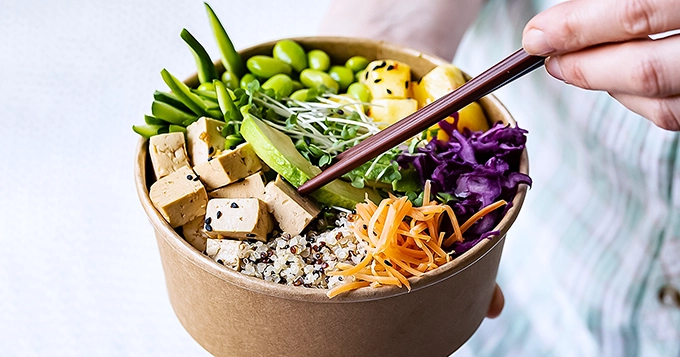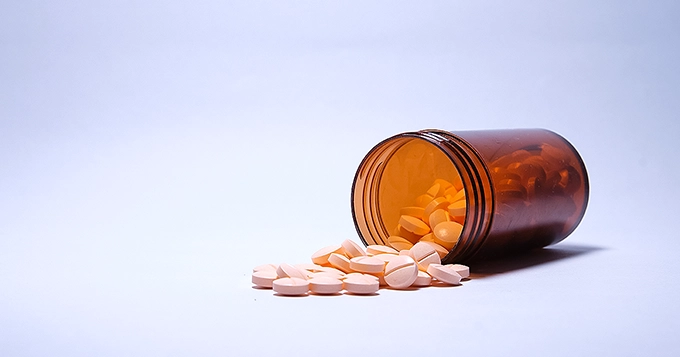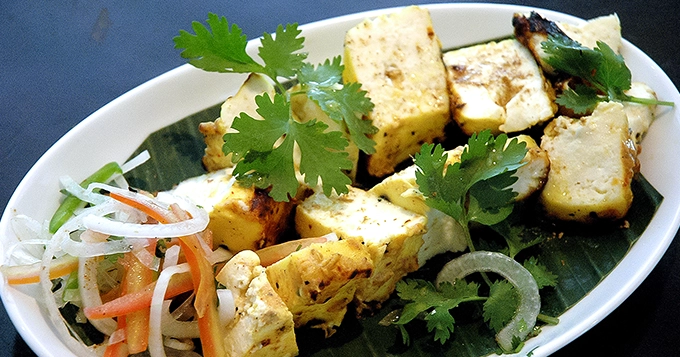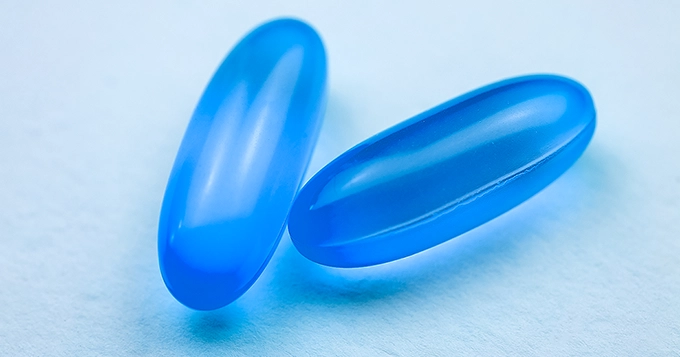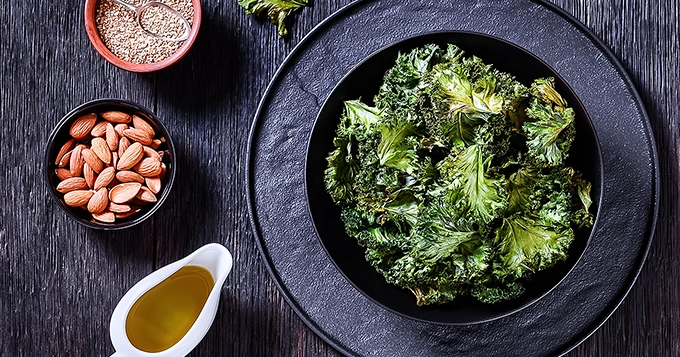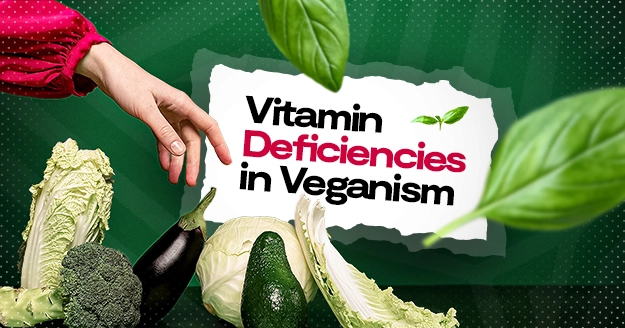What is Veganism?
Veganism is a lifestyle and diet that excludes the use and consumption of any animal products, including meat, eggs, honey, and dairy, in favor of plant-based foods.
Motivations for veganism often stem from ethical concerns about animal welfare, sustainability, and health benefits associated with a plant-based diet. Vegans advocate for minimizing harm to animals and the environment, promoting health through plant-based nutrition, and abstaining from using animal-derived materials for fashion and other products.
Overall, veganism represents a commitment to compassion, sustainability, and a more conscious way of living.
Veganism offers several potential benefits, including:
- Improved Health
- Weight Management
- Reduced Risk of Certain Diseases
- Environmental Sustainability
- Animal Welfare
- Promotion of Food Diversity
- Supports Sustainable Agriculture
However, like any dietary choice, it comes with its own set of challenges, particularly regarding vegan diet vitamin deficiencies. A well-planned vegan diet can give you the essential nutrients, but certain vitamins may be more challenging to obtain solely from plant-based sources. Let’s delve into some common vegan diet deficiencies and how to overcome them effectively.
Common Vegan Diet Vitamin Deficiencies
-
B12
Why are vegans at risk for vitamin B12 deficiency?
One of the most talked-about nutrients in veganism is vitamin B12. It is vital for red blood cell production, nerve function, and DNA synthesis. Since it’s primarily found in animal products, vegans are at a higher risk of deficiency.
As a result, vegans are advised to closely monitor their B12 intake and consider supplementation or fortified foods to prevent deficiency, as untreated deficiency can lead to serious health complications such as anemia and neurological issues. Regular blood tests may also be recommended to monitor B12 levels and detect deficiency early.
-
Zinc
Zinc is an essential mineral for immune system function, metabolism, and cell repair.
While zinc is found in various plant-based foods, the bioavailability of zinc from these sources may be lower than that of animal-based sources. Some plant-based foods also contain phytates, compounds that can bind to zinc and inhibit its absorption in the body.
Inadequate consumption of zinc may result in slow wound healing, hair loss, diarrhea, and developmental issues.
Eat a range of zinc-rich foods throughout the day to optimize your consumption. Whole grains, tofu, wheat germ, nuts, sprouted breads, legumes, and seeds are a few of these.
Consuming fermented foods like tempeh and miso, eating adequate protein, and soaking nuts, seeds, and legumes for the entire night all seem to improve absorption.
Vegans worried about their consumption of zinc or exhibiting signs of vegan vitamin deficiency symptoms might want to think about supplementing with a daily dose of zinc citrate or zinc gluconate.
-
Heme Iron
Vegans are at risk for heme iron deficiency, as iron from plant-based sources, also called non-heme iron, is less readily absorbed by the body than iron from animal products (heme iron).
Non-heme iron is poorly absorbed. Phytic acid is one of the anti-nutrients found in plant-based diets that can further restrict its absorption.
Antinutrients have no effect on the absorption of heme iron, in contrast to non-heme iron. As a result, compared to meat eaters, vegetarians and vegans—especially women and those following raw food diets—are more likely to get anemia.
However, there are many plant-based sources of iron, including lentils, beans, tofu, fortified cereals, spinach, and pumpkin seeds, which can help vegans meet their iron needs.
Regular monitoring of iron levels and, if necessary, supplementation under the guidance of a healthcare professional can also help prevent iron deficiency in vegans.
-
Iodine
Iodine is needed for thyroid function and overall metabolic health. It is primarily found in seafood, dairy products, and fortified salt.
An inadequate intake of iodine may result in hypothyroidism.
Fortunately, certain plant-based foods like seaweed contain iodine, and the amount can vary widely depending on factors such as the type of seaweed, its processing, and the soil’s iodine content where it was grown. For example, food grown near the ocean typically has higher iodine content.
Consider taking an iodine supplement if you’re a vegan and don’t want to eat seaweed frequently or use iodized salt in your diet.
-
Vitamin D3 (Cholecalciferol)
This form of vitamin D is primarily found in animal-based sources such as fatty fish, liver, and egg yolks.
Yes, the body can produce vitamin D3 when the skin is exposed to sunlight. However, vegans who live in regions with limited sunlight or who have limited sun exposure due to factors like sunscreen use, covering their skin, or spending most of their time indoors may be at increased risk of deficiency.
Some plant-based foods are fortified with vitamin D2 (ergocalciferol), such as fortified plant milks, juices, and cereals; however, vitamin D2 may not be as effective as vitamin D3 in raising blood levels of vitamin D.
Vitamin D is essential for maintaining bone health, supporting immune function, and regulating mood. D3 vitamin deficiency for vegans can lead to health issues such as weak bones (osteoporosis), muscle weakness, increased risk of fractures, and compromised immune function.
Maximizing sun exposure when possible, consuming fortified foods, and considering vitamin D3 supplements derived from vegan sources (such as lichen-derived supplements) can help vegans maintain optimal vitamin D status.
-
Docosahexaenoic acid (DHA)
DHA is an omega-3 fatty acid found predominantly in fatty fish and seafood. While the body can convert another omega-3 fatty acid, alpha-linolenic acid (ALA), found in plant-based sources like flaxseeds, chia seeds, hemp seeds, walnuts, and certain oils, into DHA, this conversion process is limited and inefficient.
Because DHA plays crucial roles in brain function, eye health, and cardiovascular health, deficiency can lead to adverse health effects, particularly in pregnant and breastfeeding women, infants, and individuals with increased DHA needs.
To mitigate the risk of DHA deficiency, vegans can consider consuming plant-based sources of ALA regularly and incorporating algae-derived DHA supplements or algal oil into their diet. Algae supplements provide a direct source of DHA and are considered a vegan-friendly alternative to fish oil supplements.
-
Calcium
Calcium is essential for bone health, nerve transmission, muscle function, and other vital physiological processes.
To minimize the risk of calcium deficiency, vegans should focus on incorporating calcium-rich foods, such as tofu made with calcium sulfate, fortified plant milk, leafy greens such as kale and collard greens, almonds, sesame seeds, and fortified orange juice into their diet regularly.
It’s also important to pay attention to factors that can affect calcium absorption, such as consuming foods high in oxalates (e.g., spinach, beet greens) or phytates (e.g., whole grains, legumes) in moderation and ensuring an adequate intake of vitamin D, which aids in calcium absorption.
Calcium supplements can be considered for vegans who may have difficulty meeting their calcium requirements through diet alone.
Nutritional planning is important to mitigate the risks of vegan diet vitamin deficiencies and ensure optimal health outcomes for individuals following a vegan lifestyle.
